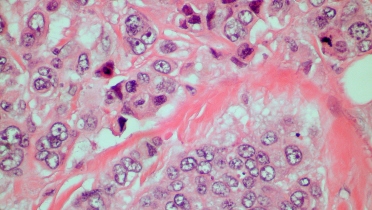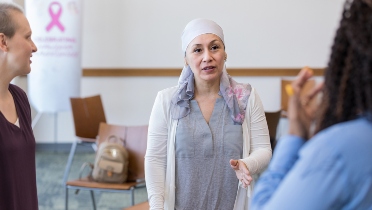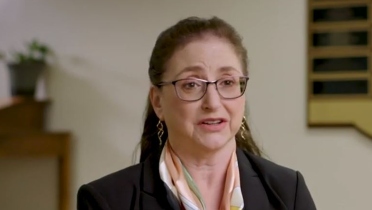Ribociclib, Endocrine Therapy Combination Improves PFS in Aggressive Breast Cancer
The combination of ribociclib and endocrine therapy may outperform standard-of-care combination chemotherapy for patients with aggressive breast cancer, according to phase 2 study data presented at SABCS 2022.
Through the use of first-line ribociclib plus endocrine therapy, clinicians may be able to avoid or delay chemotherapy and spare patients from the toxicities and discontinuations associated with chemotherapy.
In the RIGHT Choice trial, the researchers randomly assigned patients with HR-positive, HER2-negative breast cancer to daily ribociclib (600 mg on a 3-week cycle, followed by 1 week off) plus letrozole/anastrozole and goserelin, or to investigator’s choice chemotherapy.
All patients had no prior exposure to systemic therapy, and the cohort included both premenopausal and perimenopausal women.
Patients enrolled in the trial exhibited clinical features considered not amenable to curative therapy, such as symptomatic visceral metastases, rapid disease progression, impending visceral compromise, or symptomatic non-visceral disease.
In total, the study included data from 222 patients, of whom 112 were assigned ribociclib plus endocrine therapy, and 110 were assigned to chemotherapy.
Within the cohort, 67.6% (n = 150) had visceral metastases, 18.5% (n = 41) exhibited rapid disease progression, 14% (n = 31) had markedly symptomatic nonvisceral disease, and 52.3% (n = 116) had visceral crisis by National Comprehensive Cancer Network guidelines.
The median follow-up was 24.1 months.
At the time of reporting, 45.5% of patients assigned ribociclib plus endocrine therapy remained on treatment, as did 23.6% of those assigned chemotherapy.
Ribociclib plus endocrine therapy demonstrated a statistically significant PFS benefit compared to combination chemotherapy.
Patients assigned to ribociclib plus endocrine therapy also achieved a longer median time to treatment failure.
Both treatment platforms demonstrated a similar ORR (65.2% vs 60%). Fewer treatment-emergent serious adverse events (1.8% vs 8%) and discontinuations (7.1% vs 23%) were observed among patients assigned to ribociclib plus endocrine therapy.
No new safety signals were reported for ribociclib, and adverse events associated with chemotherapy were consistent with the known safety profile.
“Compared with combination chemotherapy, ribociclib plus endocrine therapy may offer more durable antitumor efficacy with better tolerability and compliance. Overall, these improvements in outcomes and tolerability should translate into an evolution of our standard of care for patients with hard to-treat breast cancer, providing clinicians with guidance for treating this patient population,” Yen-Shen Lu, MD, PhD, professor of medicine at National Taiwan University Hospital, wrote in the study.
--
Reference:
Lu Y, et al. First-Line Ribociclib Plus Endocrine Therapy May Be Superior to Combination Chemotherapy in Patients With Aggressive Breast Cancer. SABCS 2022 (San Antonio Breast Cancer Symposium).
Disclosures: Lu declared financial ties to drugmakers. RIGHT Choice is being supported by Novartis.
Photo Credit: Getty Images.
By Cameron Kelsall, MD /alert Contributor
.jpg)















.jpg)
.jpg)
.jpg)
_.jpg)
.jpg)
.jpg)

.jpg)


.jpg)
.jpg)

.jpg)
.jpg)

.jpg)
.jpg)
.jpg)






.jpg)

.jpg)
.jpg)
.jpg)
.jpg)
.jpg)
.jpg)
.jpg)
.jpg)
.jpg)
.jpg)
.jpg)
.jpg)
.jpg)

.jpg)
.jpg)
.jpg)

.jpg)
.jpg)
.jpg)


.jpg)

.jpg)
.jpg)

.jpg)
.jpg)

.jpg)
.jpg)
.jpg)
.jpg)
.jpg)

.jpg)
.jpg)
.jpg)
.jpg)
.jpg)
.jpg)

.jpg)
.jpg)
.jpg)
.jpg)
.jpg)
.jpg)
.jpg)
.jpg)
.jpg)
.jpg)



.jpg)
.jpg)
.jpg)
.jpg)
.jpg)
.jpg)

.jpg)

.jpg)
.jpg)
.jpg)
.jpg)
.jpg)

.jpg)



.jpg)
.jpg)
.jpg)
.jpg)


.jpg)
.jpg)
.jpg)
 Featured Breast Cancer Videos
Featured Breast Cancer Videos.jpg)